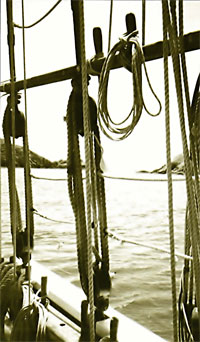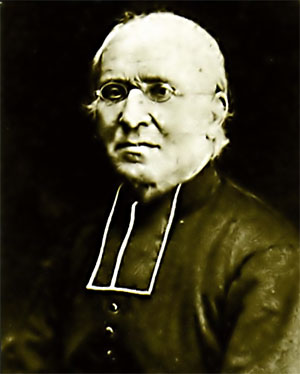The Mayet Memoirs
 On Wednesday September 16, 1846, during the general retreat at Puylata, Father Colin turned to the young men, addressing them in vigorous terms…. “Be filled with a holy courage. When I read the letter from Father Calinon, which paints such a terrible picture of their sufferings, I said first of all: ‘This letter will not be published in the “Annals of the Propagation of the Faith.”‘But then afterwards I said: ‘It must be published. People must know everything beforehand.’How our confreres have suffered! Often, they tell us, they do not have as much for a meal as we have for one of our Lenten meals in Europe, and even then they can only have this scanty are once a day….In France we would give way, but out there they stand firm…. It is certainly not the place to look for what is known as a it of comfort.”
On Wednesday September 16, 1846, during the general retreat at Puylata, Father Colin turned to the young men, addressing them in vigorous terms…. “Be filled with a holy courage. When I read the letter from Father Calinon, which paints such a terrible picture of their sufferings, I said first of all: ‘This letter will not be published in the “Annals of the Propagation of the Faith.”‘But then afterwards I said: ‘It must be published. People must know everything beforehand.’How our confreres have suffered! Often, they tell us, they do not have as much for a meal as we have for one of our Lenten meals in Europe, and even then they can only have this scanty are once a day….In France we would give way, but out there they stand firm…. It is certainly not the place to look for what is known as a it of comfort.”
Death of a missionary
Mayet recorded many stories of Colin’s concern for the missionaries who went to Oceania. On more than one occasion he told how Colin was unable to face the moment when he had to say goodbye to them, and hid himself in another part of the house when the missionaries left. Mayet also tells a delightful story of how Colin and a missionary just returned from Sydney talked right through the night, and stopped only when the bell sounded in the morning for rising. But the most poignant story Mayet tookfrom Colin’s own lips. Colin was speaking of his reaction to receivingthe first batch of letters from the group of missionarieswho left in 1836. Among this group was Father Claude Bret, who died at sea just three months after leaving France. News of his death came in the first batch of lettersfrom the missionaries. Mayet records Colin saying:
“When 1received the first letters after the departure of the first band, I opened them alland glanced at all the signatures before reading them, and on the way into dinner I said to myself: But there’s one who hasn’t written. Why did Father Bret not write? That’s wrong of him. And then, after the meal I started to read them and the first lines informed me of Father Bret’s death. He couldn’t write tomes ince he was dead! I immediately burst into tears. That is how we learned the news, and we all went to the chapel, crying, to pray for him.”
Founder of the missions

It is hardly possible to talk of the Marist missionary enterprise without meeting a most remarkablepersonality, Father Victor Poupinel.Poupinel entered the Society of Mary as a deacon in 1838, and was professed as a Marist in 1839. Colin immediately chose him to fulfil the task of Procurator to the Missions. He carried out this work for 20 years: from 1840 till 1857, and from 1871 till 1874. In the intervening 13 years (1857-1870) while based in Sydney he was the roving Visitor to the Missions, which meant he travelled constantly around the Pacific. Then from 1873 to 1884 he was the Assistant General with special care for overseas missions. This means that the whole of his 45 years as a Marist was spent for the Missions. His output of letters was remarkable. On some days he would write anything up to 47 letters, and they would all be very full letters.
Victor Poupinel had personal contacts in almost every mission station in the Pacific Islands, and he was to have a great influence on the history of the branch of the Society which became the Missionary Sisters of the Society of Mary. A Marist confrere wrote of him:
“Father Poupinel was never a missionary in the strict sense as some would define it. In fact, he never founded nor strictly speaking directed any station or Mission. And yet his confreres, those heroic founders at the beginnings, those patient and persevering men of the first 50 years of Marist mission in Oceania, don’t hesitate to give him the titles of “founder’: “father” and ‘protector” of the Missions of the Society of Mary… He was a man of prayer and action, both developed to a high degree, and he exercised a profound influence on those who followed him.”
Marist Fathers’ Constitutions
Marists are called to establish the Church where it does not exist and to renew existing communities rather than to participate n its activities in places where it is already established with sufficient resources.
– Constitution 14
The story of the Oceania mission is a story of unending courage in the face of enormous difficulties. Colin himself spearheaded this mission thrust.
Between 1836 and 1849 he had sent to Oceania the very best of his men: 74 priests, 26 of Champagnat’s “Little Brothers of Mary”, and 17 of his own “Joseph Brothers” in 15 successive groups. This represented an enormous numberfor a Congregation which was still in its infancy. Of these men, 21 missionaries had died before 1854 when Colin resigned as Superior General of the Society of Mary.
The rest were spread through the mission of New Caledonia, Wallis, Futuna, New Zealand, Tonga, Fiji, Samoa and Sydney, which had become the missionaries’ centre.
But apart from the difficulties of missionary life in itself, personal difficulties and misunderstandings between the missionaries and their bishops, and between Colin and two bishops in particular, demanded even more heroism of the priests and brothers in those mission areas.
Colin was deeply aware of the difficulties they were working under and spoke often of his admiration for them. On one occasion he wrote about a group of Marists who had to leave an area where they had worked for 14 years, because of difficulties with the bishop: “Gentlemen, what heroism! What magnificent abnegation! These virtuous confreres have abandoned a church founded by them through 14 years of sweat, sufferings and privations of every description, saying, “Fiat voluntas Dei” (“Let God’s will be done”) and after consuming their youth, and their health, they generously go to start over again elsewhere … without looking back. The letters they send me are admirable! If the history of the Society and the missions were being written, here is a beautiful page, an uncommon deed, heroic and above all praise. One does not often see such examples.”
But Colin grew more and more concerned for the welfare of his men in the Pacific.
He felt that they were being expected to live in a way that was incompatible with the demands of Religious life.
From 1845, he began to slow down the flow of missionaries to Oceania. On July 14 1849 four priests left for the Islands. They were the last that Colin would send. But almost at the same time, another branch of the Marist family began to develop, a branch which would be the source of equally uncommon deeds.
In 1845 the first woman responded to the call to be Marist and missionary.